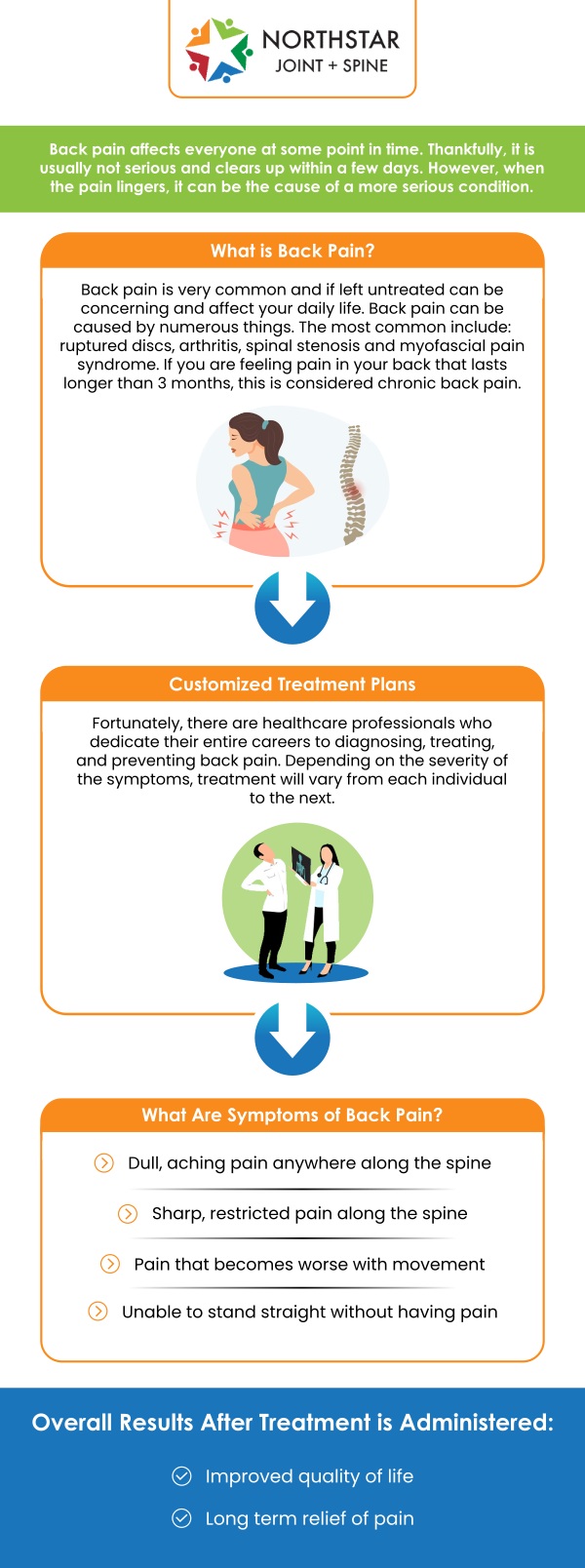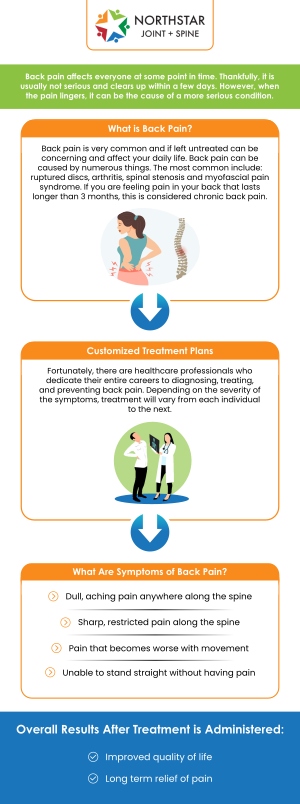When Can a Doctor Help Your Back Pain?
Back pain is a widespread concern, but recognizing the right time to consult a doctor can significantly impact your recovery. Dr. Robert J. Nocerini, a Board-Certified spine specialist at Northstar Joint and Spine, offers a thorough evaluation to identify the underlying cause of your back pain and recommend the most effective treatment options. Whether dealing with a muscle strain, or a chronic condition, getting effective care can help you achieve lasting relief and improve your quality of life. For more information, contact us today or schedule an appointment online. We are conveniently located at 7704 San Jacinto Pl Suite #200 Plano, TX 75024.


Table of Contents:
At what point should you go to the doctor for back pain?
What can a doctor do for bad back pain?
How long can lower back pain last?
How can you tell if back pain is muscular or something else?
At Northstar Joint and Spine, we understand that experiencing back pain is a common issue that many individuals face at some point in their lives. Our team of specialized healthcare professionals is dedicated to helping you determine when it’s crucial to consult a doctor for back pain to ensure effective treatment and prevention of further complications.
For mild back pain that improves with self-care measures like rest, over-the-counter pain relievers, or gentle exercises, a doctor’s visit may not be necessary. However, it’s important to seek medical attention in certain situations where back pain persists or worsens. If your pain lasts more than a few weeks despite home treatment, it’s a good idea to consult a doctor for a thorough evaluation and personalized care plan.
Severe or progressively worsening pain, or pain that occurs suddenly, is another reason to see a doctor. In such cases, a professional can help rule out serious conditions like fractures and offer appropriate treatments. Furthermore, if back pain is associated with symptoms such as weight loss without explanation, swelling, fever, or neurological issues like tingling, numbness, weakness, or loss of bowel/bladder control, immediate medical attention is necessary due to the possibility of spinal cord involvement or nerve compression. Individuals who have had cancer, osteoporosis, or immune system issues should consult a healthcare professional, as even slight back pain may need assessment.
In cases of severe back pain, the first step for a doctor is to carry out a detailed examination aimed at uncovering the root cause. This might involve a physical check-up, an assessment of the medical history, and potentially imaging examinations. After identifying the cause, the physician might suggest treatments that include altering one’s lifestyle, engaging in exercises aimed at improving posture, or undergoing targeted therapies to fortify muscles and ease pain.
Should the pain continue or result from a more serious issue, the physician may look into more advanced treatments such as nerve blocks, epidural steroid injections, facet injections, spinal cord stimulation, or sacroiliac injections. Only in exceptional instances may it be necessary to resort to surgery. These treatments aim to relieve symptoms, decrease inflammation, and enhance mobility, thereby assisting the patient in resuming daily activities. To monitor progress and adjust the treatment plan as needed, regular follow-up appointments may be necessary.
Our ultimate goal is to not only alleviate your pain but also enhance your overall quality of life by restoring mobility and function. Trust Northstar Joint and Spine to guide you on your journey to recovery and improved well-being.
We at Northstar Joint and Spine recognize that lower back pain is a frequent ailment that can greatly affect your everyday activities. Our practice focuses on delivering personalized care for the different stages of lower back pain, guaranteeing that you receive the treatment best suited to your individual needs.
The duration of lower back pain can differ based on its underlying cause and intensity. Acute lower back pain, which is often the result of a muscle strain, typically lasts anywhere from a few days to a few weeks. In this period, therapies including rest, non-prescription analgesics, and mild exercise can facilitate recovery and alleviate discomfort.
Subacute lower back pain lasts for a duration of four to twelve weeks. At this point, it may be advised to pursue physical therapy and make lifestyle changes to support healing and avert the development of chronic pain.
Chronic lower back pain lasts longer than twelve weeks. Treatment for chronic pain often involves a combination of medical interventions, and physical therapy. A comprehensive approach is essential to managing symptoms and improving the quality of life.
Aspects including age, general health status, and prior conditions such as arthritis or disc degeneration can influence the duration of lower back pain and its likelihood of recurrence. By managing and reducing future pain episodes, professional care tailored to your circumstances can help you stay active and maintain a fulfilling lifestyle.
At Northstar Joint and Spine, Dr. Robert J. Nocerini specializes in treating back pain, whether muscular or from other causes. Our skilled team delivers precise diagnoses and tailored treatment to guarantee that each patient receives effective relief.
Since back pain can arise from multiple sources, it is essential to differentiate muscular problems from other possible conditions to provide effective treatment. Muscular back pain, often resulting from strain, overuse, or poor posture, is usually marked by soreness, stiffness, or a dull ache localized to a particular region of the back. It is common to recommend rest and therapeutic methods such as heat therapy to help relax the muscles and ease discomfort.
However, not all back pain is muscular. If pain radiates down the legs or manifests as sharp, shooting sensations, it could suggest nerve involvement, such as sciatica or a herniated disc. In these instances, diagnostic procedures such as imaging are employed to evaluate the root cause and inform suitable treatment. Additionally, it is crucial to be vigilant for indications that point to a potentially more severe problem—these include fever, weight loss that cannot be accounted for, and cancer history—as they could signify infections or malignancies. If you experience severe pain accompanied by neurological symptoms, such as loss of bladder or bowel control, it’s vital to seek medical attention immediately, as these could signal serious conditions.
At Northstar Joint and Spine, we provide a comprehensive evaluation of your back pain, considering its symptoms and medical history. If you’re experiencing persistent or severe lower back pain, contact us today or schedule an appointment and start your recovery journey. We are conveniently located at 7704 San Jacinto Pl Suite #200 Plano, TX 75024. We serve patients from Plano TX, Willow Bend TX, Frisco TX, Allen TX, Addison TX, North Dallas TX, and surrounding areas.

Additional Services You May Need
▸ Back Pain
▸ Chronic Pain
▸ Epidural Steroid Injections
▸ Spinal Cord Stimulation
▸ Viscosupplementation
▸ Genicular Nerve Blocks
▸ Facet Injections
▸ Joint Injections
▸ Sacroiliac Joint Injections
▸ Lumbar and Cervical
▸ Facet Medial Branch Blocks
▸ Diagnostic Nerve Blocks
▸ Medication Management
▸ Neck Pain Doctor
▸ Diabetic Peripheral Neuropathy
▸ Headaches
▸ Suboxone
▸ Botox for Migraines
▸ Peripheral Nerve Stimulation

Additional Services You May Need
▸ Back Pain
▸ Chronic Pain
▸ Epidural Steroid Injections
▸ Spinal Cord Stimulation
▸ Viscosupplementation
▸ Genicular Nerve Blocks
▸ Facet Injections
▸ Joint Injections
▸ Sacroiliac Joint Injections
▸ Lumbar and Cervical
▸ Facet Medial Branch Blocks
▸ Diagnostic Nerve Blocks
▸ Medication Management
▸ Neck Pain Doctor
▸ Diabetic Peripheral Neuropathy
▸ Headaches
▸ Suboxone
▸ Botox for Migraines
▸ Peripheral Nerve Stimulation






